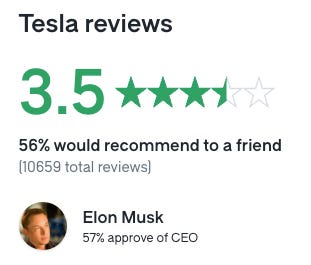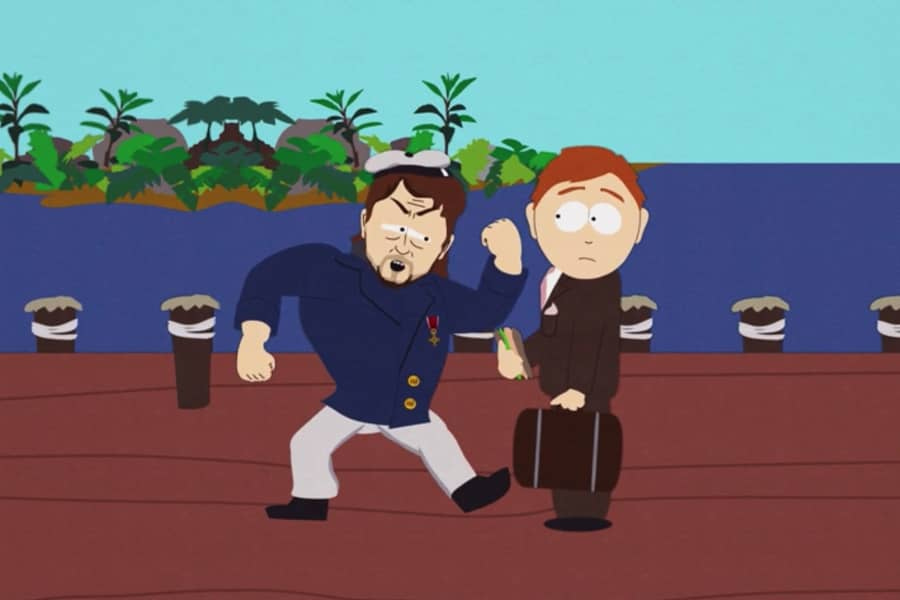Certain topics become big public controversies precisely because they have multiple reasonable, yet incompatible, explanations. Is it two faces or a vase? Is the dress blue or yellow? Is Edward Snowden a traitor? If the answer were obvious to all, there’d be no controversy and therefore we wouldn’t be arguing about it in the first place. So it must somehow be both, except it can’t be both simultaneously because the two sides are contradictory. So we organize ourselves into rival camps arguing for each side of the disagreement, and a controversy is born.

Our latest public controversy is the question of Elon Musk’s, well, brain. How high is his IQ? How exactly do we define “competence”? Is he having a mental breakdown? Is he saving the government or destroying it? What the hell is with this guy?
Here it is in a nutshell: How is it that someone with a track record of such stunning success in business (that’s the “competence”) can be ignorant and deranged in so many ways that are reminiscent of the most deluded and incompetent people we’ve ever met in our lives? This is the world’s weirdest Rorschach Test, right? He can’t be smart AND dumb at the same time, right? Don’t we have to pick?
Antibody theory
I have a pet theory that squares the circle on this question, and I call it the antibody theory of Elon.
You know how when a foreign invader penetrates the body (say a virus or a vaccine), the body produces antibodies that not only fight off the invader, but make the body stronger and more resilient against future infection? That’s how I think Elon’s organizations respond to his chaotic leadership. And this is how an “incompetent” person can produce highly competent and effective organizations.
I have a few friends who have worked reasonably high up in several of Elon’s companies — high enough to have had plenty of meetings with the man himself. The stories they share about Elon meetings are all pretty similar. Often they feature Elon hyper-fixating on some detail of a presentation that he found unsatisfactory, sometimes capriciously firing a random employee in response, and demanding that the team accomplish some new, impossible task in order to satisfy him. By “impossible” I don’t mean in the sense of requiring superhuman work effort on a tight deadline; I mean “impossible” as in violating the laws of physics. You hear this over and over, whether it’s Tesla or SpaceX or Twitter or whatever.
The fact that Elon is known to behave in business settings like the worst ex you’ve ever had isn’t really what makes this interesting. What’s interesting is that, according to people who work at these companies, the chaotic behavior often provokes extremely productive outcomes within the organization. This seems to come primarily in two forms:
Sometimes this happens in the form of Elon getting what he wants. In a defiant effort to prove Elon wrong, the team will race forward on his mandate and sometimes realize that he was right, or at least less wrong than they had initially believed. Because the effort was fueled by animus and rage and spite, this result was reached much quicker than it otherwise would have been.
Sometimes Elon doesn’t get what he wants because it actually is impossible. But because “no” is not an acceptable answer to Elon, the team has to reach its goals in a clandestine manner — if he finds out you’re not doing what he asked, you’re fired. This also means speed, because the faster the team can do what they had planned to do all along before Elon did his meddling, the faster they can prove that their approach was correct and his was wrong (and therefore save their jobs).
In both cases, two things are true: 1) Everyone is pissed off at Elon and wants him to go away; and 2) The group does better work and arrives at the right decision more quickly than if he hadn’t antagonized them. He’s the virus, they’re the body, and now the body has better antibodies to defend it from the next viral attack. Repeat this over and over, all throughout the organization, and eventually you have a pretty high-performance company.
This means that the fact that Elon is impulsive, abrasive, confrontational, and often wildly uninformed is somehow a feature rather than a bug. These are the actions of an invader causing tissue damage and provoking an immune response. It also explains the paradox of how so many people at his companies sincerely dislike him yet feel like they are doing the best work of their careers.

MBWA: Management by Widespread Antagonism
If the average big company CEO is like the Emperor Hirohito — cloistered in his imperial palace, completely out of touch with the situation on the front lines, and only able to comprehend the world via thirdhand reports from scurrilous and self-interested generals — then Elon is like a version of Napoleon Bonaparte who gets into a fistfight with a different platoon leader every single day, and whose army is so annoyed by this that they conquered Europe just to spite him.
Importantly, to pull of this strategy you really need to be okay with people hating you. Most business leaders want to be loved, and many will put off uncomfortable but necessary conversations in order for their image to remain pristine.
Elon inverts this deliberately. Think about what type of person is comfortable sending out a “what did you get done this past week?” e-mail to 3 million Federal employees. You’d have to be incredibly impervious to people calling you an asshole. And the only reason to dress like this is because you really want people to think you actually are one:
When people jeer at Elon for being so oblivious to how he comes off, I think they are missing the point that this is all deliberate. And the reason it’s deliberate is because he’s gotten incredibly good results from it in the past. Why would he stop now?
Is this good? Is this bad?
I’m not here to judge, although I have some reservations over whether the Federal bureaucracy is going to react as beneficially to the Elon-virus as, say, the Twitter engineering department. Instead of passing judgement, I think there are a few important takeaways from this theory:
People yelling on the internet, especially liberals, love to call out hypocrisy as if the fake internet points you get for finding it can be traded in for anything at all. I’ve been doing this too, like when I demanded that Elon and Trump conform to the standards of logical reasoning that I require of them. (You really showed them there, Pat; I bet those 4 “likes” felt really good.) But power doesn’t care about hypocrisy. Calling someone out for being a jerk doesn’t work very well when they’re doing it intentionally. All you’re doing is getting angry and giving them what they want.
Although I am loathe to give him credit for (in my view) acting like a total jerk to Ro Khanna, who I really like, there probably is something to this idea of J.D. Vance’s that we are way too precious about the exact words people use, equating them with actual violence. When we get triggered by something we see online, the next question is: Are you going to crumble from this, or will you develop your own antibodies? If Elon/DOGE/Trump all fail, it won’t be because of stupid things they tweeted, it will because of unethical acts they committed.
If for nothing else, I appreciate that Elon is showing us new and interesting ways to assemble and motivate organizations. And if DOGE is a total disaster, at least we’ll have learned something new there too.
With all that said… I think it’s better for people to voluntarily opt-in to workplaces with leadership of this type, rather than have it foisted upon them after decades of committed labor.







You get 5 gold stars for trying to glean some useful leadership advice from Elon and DOGE. And your "motte and bailey fallacy" was insightful, I even shared what you wrote with my wife. But is this antibody theory like saying "Anne Frank was a great writer, so we need more Nazi's" to create the horrific conditions that will result in great writers? I don't think you're suggesting that. The value of a diamond is in the diamond, not the fire and pressure surrounding it.
For me it is easier to understand Elon's volition from his privileged apartheid‐era schooling at the white-male only Pretoria Boys High School, and his grandfather's "technocracy" dogma, with dehumanizing (racist and misogynistic) values that were cloaked for many years. His main validation for ideas is "First Principles thinking", but he often commits to Flawed Principles by assuming he is an expert at all things. Now he feels emboldened with this "Liberterrorism" inspired by Curtis Yarvin and directed by Russ Vought, and clearly has targeted the federal departments that he felt were blocking him. But I believe Trust is Currency, and Elon is losing trust. Already we have seen dramatic declines in the sales of Teslas worldwide. His tech bros on X are insulating him from what real people think, but shareholders will sue him (again), while cities, states, and countries will cancel contracts for Starlink, Tesla Energy, etc. Competitors will take the lead. Americans did not vote for an oligarchy, and we should not hold Elon up as a model for future entrepreneurs. Steve Jobs was "mercurial", but he was not dehumanizing like Musk. I can't imagine Elon saying anything that respects human dignity like this: "There's lots of ways to be as a person, and one of the ways that I believe people express their appreciation to the rest of humanity is to make something wonderful and put it out there." - Steve Jobs
I think you want "diverse viewpoints" here, so there's mine. :)
"If for nothing else, I appreciate that Elon is showing us new and interesting ways to assemble and motivate organizations. And if DOGE is a total disaster, at least we’ll have learned something new there too."
Terrible take. DOGE is blowing up the entire federal bureaucracy, the federal workforce will probably never be the same for the rest of our lives.
That's not something where you just try it for fun on a whim and then if it doesn't work out you go "oh well tee hee, at we learned something new!"
Maybe that flies with blowing up Twitter, not with the US government.